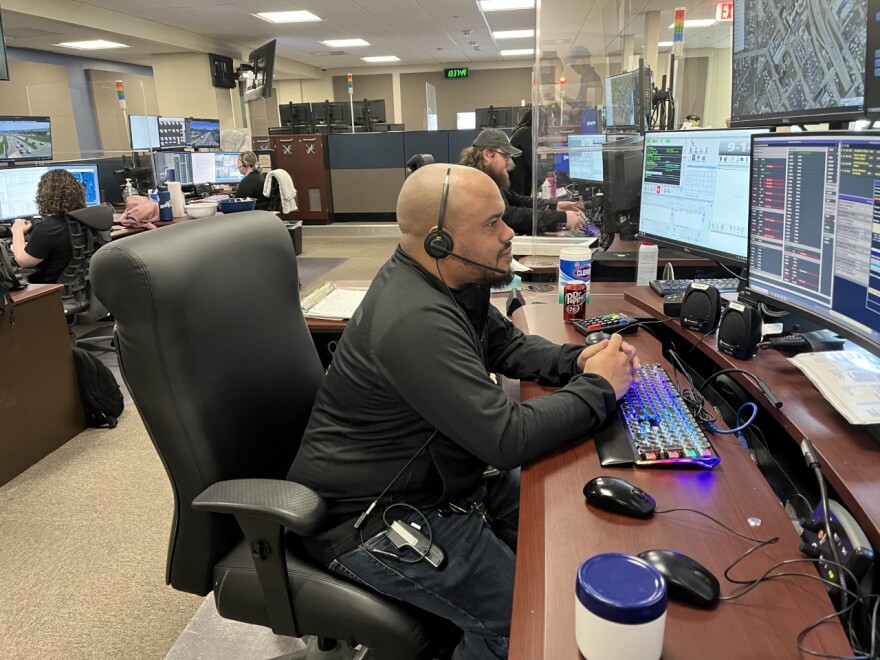It’s National Public Safety Telecommunicators Week and to celebrate, the dispatchers manning the phones 24 hours a day at the Peoria Emergency Communications Center opened its doors to spotlight the technology and people making fast, efficient emergency response possible.
The nondescript stone municipal building on SW Adams Street is home to the bustling center that currently employs 20 dispatchers — 10 short of the 30 considered full staffing.
Director Brandon Blayney said the center serves as dispatch for seven law enforcement agencies, 12 fire departments and three ambulance services spread across Peoria County. Blayney said the center took a total of 303,412 calls.
“We like to say we’re Peoria’s first-first responders,” said Blayney. “We’re the calm voice in the darkness. We never know what will be on the other end of that phone when we pick it up. But what we do know is the person will be in distress.”
The high-stress nature of being a dispatcher means they need a range of tools and technology to do their job effectively. Blayney said there’s been a lot of advancement in the technology used since dispatch services started in Peoria in the 1950s.
These advancements include a mapping system that shows the location of incoming phone calls within five meters and follows them for five minutes after they’re disconnected, called RapidSOS. There’s also a program that walks dispatchers through medical emergencies called ProQA. In the last few years, the center introduced the option for citizens to text their 911 emergencies to the dispatchers in unique situations.
“The main objective of our telecommunicators has stayed the same,” said Blayney. “And that's to serve and protect both the residents of the Peoria area as well as the first responders.”

Damairus Reddick started as a dispatcher at the Emergency Communications Center about five years ago. He came from working dispatch at an ambulance company in St. Louis, but said he found dispatching at the center was a “whole different ball game.”
Reddick was taking calls two days after starting training.
“You want to, you know, get your feet wet and get into it,” he said. “And it's easier as you do it rather than observing. But it is something that kind of catches you off guard on your initial first call.”
Reddick said the number of calls a day can vary wildly, but top out at hundreds of calls in one shift. Shifts are 6 a.m. to 2 p.m., 2 p.m. to 10. p.m. or 10 p.m. to 6 a.m. The dispatchers switch desks and organizations they're dispatching for from shift to shift. Because of this, many of them have customized keyboards, some with mechanical switches and light features.
There’s all sorts of reasons an emergency call can be stressful for the dispatcher: the caller could be in a life or death situation, they could be reluctant to share vital information for the first responders and it’s often a situation where every moment is critical.
“I tell myself, you know, it's the worst day for whoever's coming on that side of the phone, whether it's a stubbed toe, or it's an actual emergency, it's their worst day,” said Reddick. “And so you have to take that into consideration as they're frantic on the other side of the phone, you have to be that calming voice for them and help center them.”
The office includes a “quiet room” where dispatchers can sit and collect their thoughts after a particularly difficult call.
“Having a place where you can decompress and kind of gather your thoughts in the middle of a shift rather than having to wait eight hours after your shift, because there's been times where I've walked into a CPR call and I just got here,” said Reddick. “So just having some place where you can mentally decompress is critical.”

Though the majority of a dispatcher’s job is about community service, there are some things the community can do to make the process a little easier.
“Every question we ask is critical,” says Reddick. “Even if it seems like a meaningless question to you, it's a reason we ask the questions. Again, we're trying to protect you, as well as the first-responders responding. So if we're asking, you know, if they have weapons, or if there's a description, it's all for a reason.”
Reddick said, on the toughest days, his coworkers serve as his support, too. He said anyone considering a career in dispatch should be prepared for anything.
“It's hard to say what to prepare for it, because you get everything,” Reddick said. “But just be patient. You know, knowing your surroundings is critical in this kind of line of work. And just, you gotta love working with people that don't love working with you.”
You can read more about National Public Safety Telecommunicators Week and find personal stories from dispatchers here.



